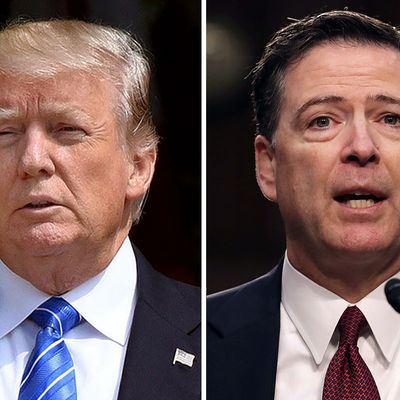
Here is an essentialist perspective to keep in mind when considering Jim Comey’s Congressional testimony before the Senate Intelligence Committee today: Underlying all the present and future controversy over the conflict between the former FBI director and Donald Trump is a question of personal credibility.
This came up directly at one moment in the proceedings, as reported by The Wall Street Journal:
Sen. Martin Heinrich (D., N.M.) notes to Mr. Comey that “a lot of this comes down to who we should believe,” and invites him to make the case for why Americans should believe him over the president.
“My mother raised me not to say things like this about myself,” Mr. Comey says—not his first reference of the hearing to how his parents raised him.
But he notes that the “significant fact” to him is that Mr. Trump asked his aides, including the attorney general, to leave the room before raising the issue of Mr. Flynn with his then-FBI director.
Why do that, Mr. Comey asked, “if it was about something else?”
This isn’t the only time Comey suggested the president isn’t being honest about his account of their interactions. He forcefully (if ironically) expressed the hope that tapes existed of their meetings (as the president hinted was possible in a famous tweet) as a way to vindicate his recollections.
On the central issue of Trump’s intentions in “asking” him to lay off Michael Flynn, Comey clearly indicated he believed the president was ordering him to do so without using explicit language (his allusion to Henry II “asking” his loyal men to do something about Thomas Becket making that clear). And in a rare flash of emotion, Comey denounced the White House’s effort to “defame” him and the FBI itself with “lies” about its morale and the quality of its leadership after firing him.
The response to Comey’s testimony by the president’s personal attorney, Marc Kasowitz, comes right back at Comey’s own honesty, and not very diplomatically. “The President never, in form or substance, directed or suggested that Mr. Comey stop investigating anyone, including suggesting that Mr. Comey “let Flynn go.” That’s one direct contradiction of Comey. Here’s the other: “The President also never told Mr. Comey, “I need loyalty, I expect loyalty” in form or substance.”
But Heinrich’s hunch that it will come down to “who we should believe” is very dangerous for Trump. Most of the Intelligence Committee senators, Republicans as well as Democrats, began their questioning with expressions of appreciation for Comey’s integrity. Telling the truth regularly and consistently is not exactly Donald Trump’s strength. Even his strongest supporters have been described (in the famous formulation of pro-Trump journalist Salena Zito) as taking him “seriously, but not literally.”
Unfortunately, factual disputes over interactions that might represent obstruction of justice is an area where it is important to be literally truthful. It is a point one would hope the president’s lawyers will impress upon him at this perilous moment.






























